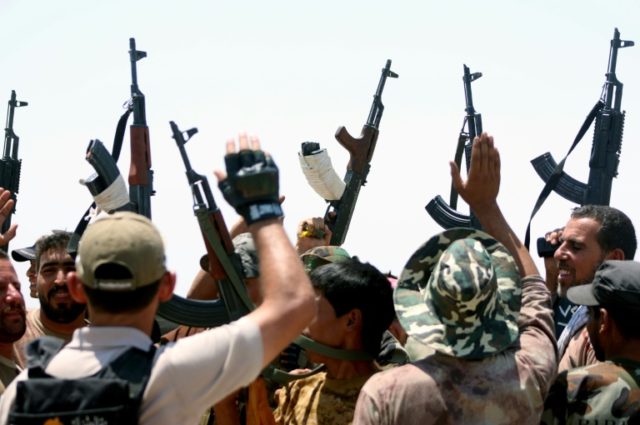The estimated 150,000 fighters of the coalition of mostly Shiite militias backed by Iran — the Popular Mobilizations Forces (PMF) — intend to use their reportedly unprecedented military power in neighboring Iraq to drive the United States out of Iraq.
On Thursday, the Washington Times reported;
The pro-Iran Popular Mobilization Forces (PMF) group is emerging as perhaps the loudest voice arguing that it is time for the Americans to go home. Iraqi media outlets have reported numerous calls from the militias for the U.S. to leave.
…
The PMF is likely to remain potent in the Iraqi domestic debate opposing a U.S. military presence, even with the resurgent Islamic State threats, one analyst in Baghdad said.
U.S. troops and the PMF, also known as the Popular Mobilization Units (PMU) and al-Hashd Shaabi, joined forces to decimate the Islamic State’s (ISIS/ISIL) so-called caliphate in Iraq, prompting top American military officials to praise the Shiite fighters’ contributions to the fall of the group’s territorial holdings in Iraq.
In May 2017, Hardin Lang, a fellow at the liberal Center for American Progress (CAP), told lawmakers that Iran-allied militias were planning to attack American troops after working with them to push ISIS out of Mosul later that year.
The PMF has repeatedly threatened American troops in Iraq and Syria.
U.S. President Donald Trump’s decision to leave behind an estimated 5,000 American troops in Iraq and his administration’s decision the sanction some PMF sanctions as a terrorist organization, prompted those wings to renew threats against America and vow to push out the United States armed forces from the country,
The Trump administration has announced plans to pull out most of its troops out of Syria, leaving behind a small force of a few hundred to ensure ISIS’s lasting defeat and combat threat posed by Iran-allied militias in the region like Hezbollah.
Some Iran-allied militias in Iraq have linked up with their counterparts in Syria, helping one another with supplies and fighters if necessary.
President Trump has ensured the 5,000 American troops in Iraq will remain, noting that they will be able to into Syria.
Although some PMF-linked politicians want the United States to leave Iraq, Iraqi Kurdish Col. Stud Barzanji urged the U.S. armed forces to stay to deal ISIS a lasting victory.
“To leave would be to make the same mistake Obama did in 2011,” he told The Washington Times from his base.
However, not everyone shares the Iraqi colonel’s position, particularly the PMF.
Washington Times noted:
The pro-Iran Popular Mobilization Forces (PMF) group is emerging as perhaps the loudest voice arguing that it is time for the Americans to go home. Iraqi media outlets have reported numerous calls from the militias for the U.S. to leave.
Citing recent instances in which Iran-allied militias attacked U.S. targets with mortars and rockets, the Pentagon inspector general noted that American troops were at risk of attacks by Shiite militias.
Baghdad has legalized the PMF as a component of the Iraqi security forces, which means the Iran-allied fighters could benefit from U.S. aid.
Washington Times reports:
The PMF formally became part of the Iraqi national security forces in late 2016, but many militia members credit Iran for supplying critical weaponry and military training in the long, successful fight to oust the Islamic State. Complicating the picture, parties tied to the PMF are now part of the federal government and have political clout.
The U.S.-led coalition and its allies have nearly annihilated the so-called ISIS caliphate, but American military and intelligence officials warn the group remains a significant threat — adopting guerrilla tactics and going underground.
“There are [Islamic State] remnants who have a presence in the mountains. They’re surrounded by our forces,” Iraqi army spokesman Brig. Gen. Yahya Rasool told the Times.
He indicated, “The terrorist group has a continued, albeit limited, ability to strike in the country.”
“They try from time to time to do attacks here and there,” Gen. Rasool further added. “Operations are still ongoing. We’re following and monitoring these terrorist movements.”
Outside Iraq and Syria, thousands of jihadis continue to support ISIS.

COMMENTS
Please let us know if you're having issues with commenting.